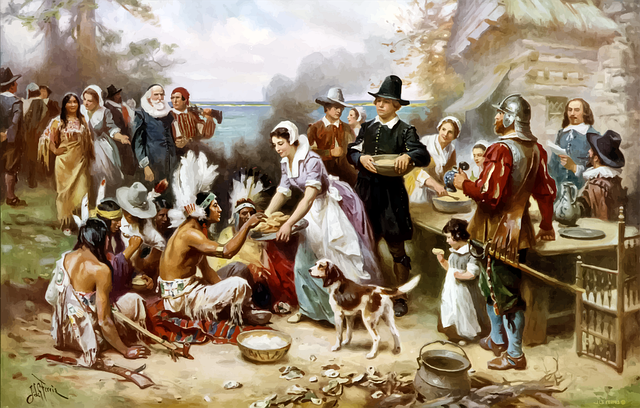Do you know how our celebration of Thanksgiving came to be? If you answered “it was a feast held between the Indians and pilgrims in late November that the Pilgrims continued every year thereafter,” you’re not alone. That’s the generally known history of Thanksgiving, but as with all legends and stories, there’s much more to the tale. The Native Americans saw the colonists starving and dying. Unlike the warlike savages they are often wrongly portrayed as, they were a hospitable and welcoming people and often greeted strangers with hospitality even Martha Stewart would approve of. They pitched in and lent a helping hand to the colonists and together they had a grand feast of maize and wild fowl sometime in late September or October. However, the colonists didn’t continue it as an annual tradition. Following their own first successful harvest, they held a day of thanksgiving and prayer, which to these early puritans was not a time for raucous celebrating and gorging. A couple of years later there was a terrible drought. When the rains had finally come and the harvest was in, they were overjoyed and the governor of the colony declared the day of prayer and fast was to be a day of thanks and feasting for the deliverance from the drought. The “thanksgiving” custom continued locally in New England for many years.
George Washington tried to bring the local custom into national recognition during his lifetime, but was unsuccessful. It was Abraham Lincoln, at the influence of Sarah Josehpa Hale, who set a date for Thanksgiving to be recognized as a national holiday. Sarah was a force to be reckoned with. She was the first female editor of a magazine in the country and routinely featured articles and tips for fashion, news, holiday celebrating, recipes, and various inventions for the home. In 1827 she had a national circulation of 150,000 and regularly featured editorial content calling for a national day of thanksgiving and recipes and ideas for celebrating it. Over the course of four decades she used her influence with the American public, senators, and presidents and accomplished her goal in 1863 when President Lincoln announced the last Thursday in November to be the new national holiday of Thanksgiving. The date was adjusted by President Roosevelt to be the fourth Thursday in order to promote post-depression holiday economics.
Sarah remained an influential editor and proponent of the advancement of education and development of women until she was 89 and died two years later. This year when we’re all sitting down to our Thanksgiving feasts, let’s take a moment to remember these unsung heroes of American history: the Native Americans for their kindness and help given to strangers in their land and Sarah Josehpa Hale for without her tireless efforts Thanksgiving as we know it today would never exist.



